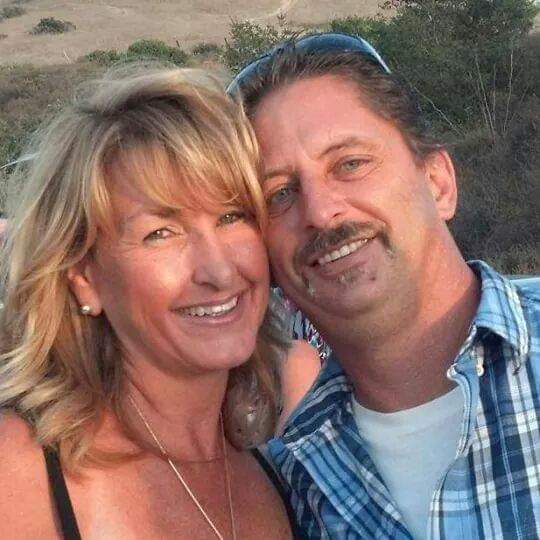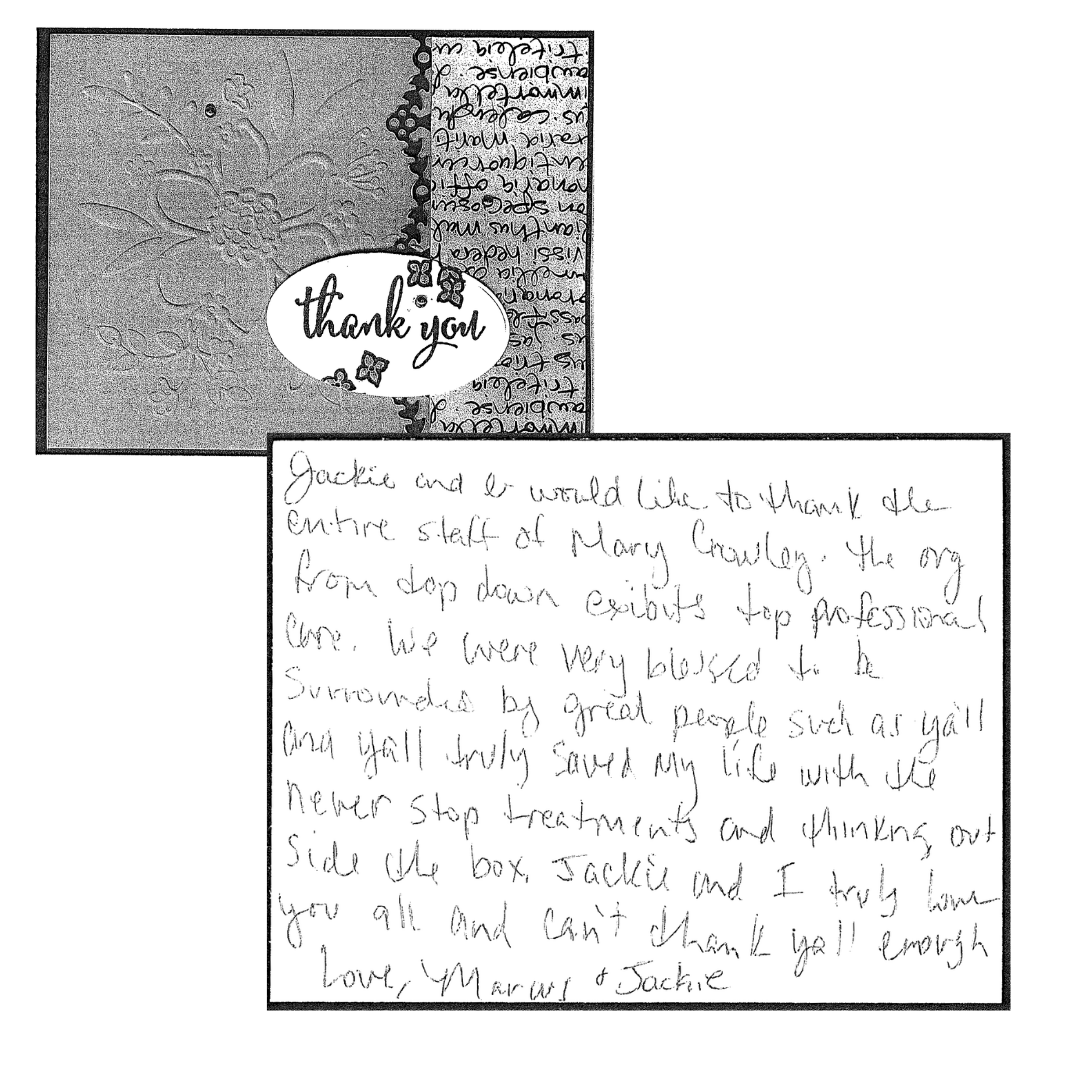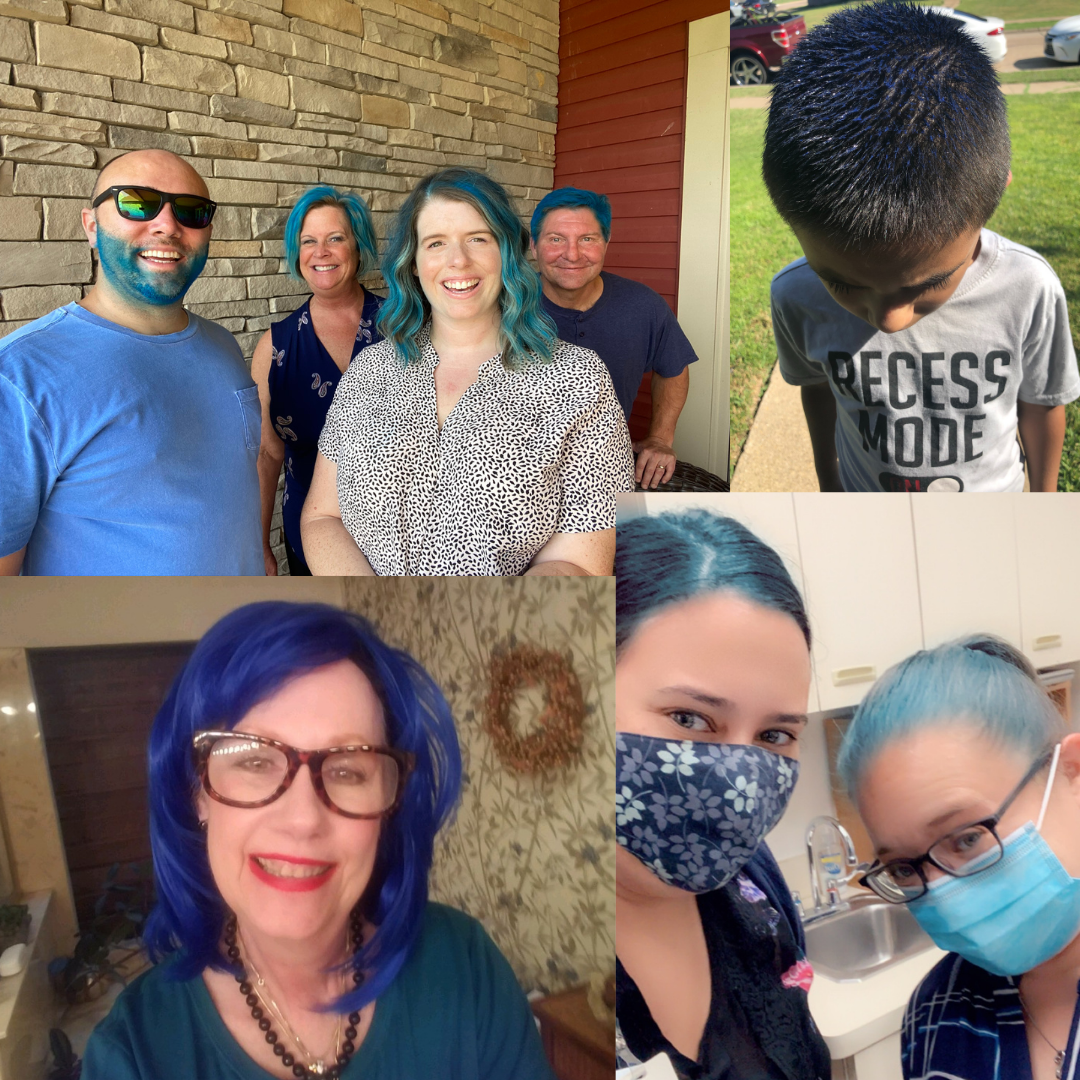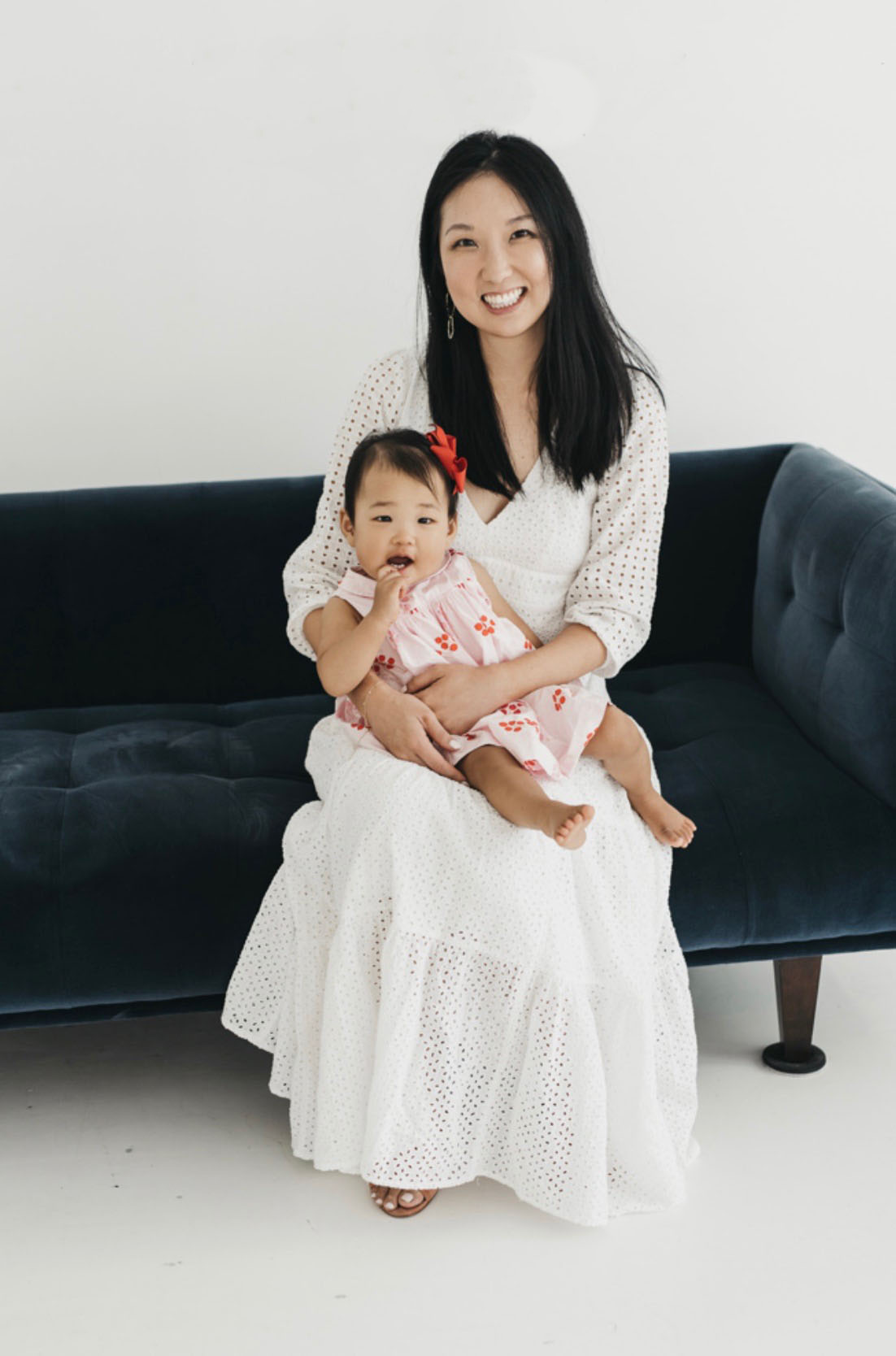
In 2008, Catherine Banach began experiencing phantom pains on her right side. She had a partial hysterectomy, removing fibroids that doctors believed were causing the discomfort, but her pain persisted. Years later, Catherine found herself in deep pain and unable to urinate. A visit to urgent care quickly turned into a visit to the hospital, and after 10 hours and a litany of tests, the doctor asked her, “Do you have an oncologist?” She was shocked. She had no family history of cancer.
Catherine had stage I ovarian cancer and tumors the size of a grapefruit in both ovaries. After surgery in January 2014, she went through six rounds of chemotherapy, resulting in a complete remission. Nearly five years to the date of her remission, Catherine began experiencing a new pain that wrapped around her stomach and sides. A CAT scan determined she needed surgery. As the surgeon reviewed her scans and information during a pre-op appointment, he apologized to her, his words still fresh in her mind: “I’m sorry, I can’t do surgery on you. You have cancer everywhere.” She was blindsided yet again.
Catherine saw her oncologist regularly, but due to her anemia, her protein levels rarely rose to an alarming level. This time, her cancer was stage IV and aggressive. She began the same chemotherapy regimen she received during her first bout with ovarian cancer, but it was too much. She flew to Mexico in search of treatments not currently available in the US, but the financial burden quickly became overwhelming.
When she returned to Texas, her oncologist offered an option closer to home: a clinical trial at Mary Crowley Cancer Research. “I was so excited,” Catherine said. “This was the answer to my prayer.”
She received an appointment quickly and was impressed by how thoroughly the staff explained every aspect of the available trials. Within a month, she enrolled on study #19-05. This targeted therapy is a phase Ib, first-in-human, dose-escalation and expansion study of XMT-1536 in patients with solid tumors likely to express NaPi2b. After just two treatments, Catherine’s tumor shrank by 1/3. She is quick to praise the staff, “With Mary Crowley, there is always someone available to talk to you and explain things to you. You have people on your side to help you get through this.”
 Catherine is now focused on her recovery with a wonderful support system behind her. Originally from California, she speaks to her family there often and recently enjoyed a visit from her father. Catherine and her fiancé Dan moved to Texas in 2017 seeking respite, which they found on a “stress-free” property in Dangerfield with a lake, six dogs, and six chickens.
Catherine is now focused on her recovery with a wonderful support system behind her. Originally from California, she speaks to her family there often and recently enjoyed a visit from her father. Catherine and her fiancé Dan moved to Texas in 2017 seeking respite, which they found on a “stress-free” property in Dangerfield with a lake, six dogs, and six chickens.
Catherine now faces her future with a new outlook. “I might have cancer, but I can live with it, and I can live a long time with it.” People often ask her advice when it comes to cancer care, and she only wishes she could offer them the same experience she’s had. “I wish there was a Mary Crowley everywhere! I feel like they’re going to be the ones that will cure cancers. They’re giving people hope!”
The Ever-Evolving Treatment for Blood Cancer
By John E. Puryear, PharmD, BCOP
The month of September allows for the celebration and awareness of multiple malignancies such as childhood cancer, ovarian cancer, gynecologic cancer, and blood cancer. Blood cancer can also be known as hematologic malignancy and encompasses disorders such as leukemia and lymphoma. It is the latter, blood cancer awareness or hematologic malignancy, that I would like to take some time to focus upon new and exciting therapy options.
For the vast majority of history, the staple treatment for hematologic malignancy has been cytotoxic chemotherapy. This was initially discovered by Sidney Farber in 1948 when he utilized aminopterin, a folic acid antagonist similar to methotrexate, to treat children with acute leukemia. This therapy cannot delineate between cancer cells and normal cells thus causing cell death in both. This failure to distinguish between cancer cells and normal cells is what leads to side effects such as hair loss, low blood counts, and gastrointestinal side effects.
For the past ten years, the primary focus of oncologic research has been in the realm of immunotherapy. With the initial approval of ipilimumab in 2011 for metastatic melanoma, immunotherapy has transitioned from metastatic treatment to front line therapy. The concept of immunotherapy is to administer a medication that marks the tumor for destruction by the patient’s own immune system. Hopefully, this will only attack the cancer cells while leaving the rest of the patient unharmed. Often the mechanism for this is the utilization of a patient’s own T-cells, which are a part of an individual’s immune system that attacks foreign substances that do not belong in the body.
 In May 2016 the FDA granted approval to nivolumab for the treatment of classical Hodgkin lymphoma, leading to one of the first times this disease would be treated with immunotherapy as compared to cytotoxic chemotherapy. From here the world of immunotherapy began to broaden with the approval of chimeric antigen receptor T cell (CAR-T) therapy in October of 2017. This therapy is customized to each patient in which the patient’s T-cells are collected and modified to include a new gene that targets the cancer cells.
In May 2016 the FDA granted approval to nivolumab for the treatment of classical Hodgkin lymphoma, leading to one of the first times this disease would be treated with immunotherapy as compared to cytotoxic chemotherapy. From here the world of immunotherapy began to broaden with the approval of chimeric antigen receptor T cell (CAR-T) therapy in October of 2017. This therapy is customized to each patient in which the patient’s T-cells are collected and modified to include a new gene that targets the cancer cells.
Moving forward with treatment options, CAR-T is becoming more and more common for hematologic and solid tumor malignancies. This has lead the way to the development of similar therapies that are composed of different cellular components along with marker specific targeted therapies leading to a vast array of personal treatment options that are designed to help maximize clinical benefit for patients and hopefully mitigate toxic side effects.
New Executive Medical Director
 Dr. Minal Barve has been named new Executive Medical Director at Mary Crowley Cancer Research. Dr. Barve has served as a physician investigator at Mary Crowley since 2006 and most recently served as Mary Crowley’s Clinical Medical Director. She is a board certified oncologist and member of Texas Oncology, American Society of Clinical Oncology, American Society of Hematology, and the Texas Indo-American Society. Dr. Barve completed her residency at Presbyterian Hospital of Dallas and her fellowship at Baylor University Medical Center in Dallas.
Dr. Minal Barve has been named new Executive Medical Director at Mary Crowley Cancer Research. Dr. Barve has served as a physician investigator at Mary Crowley since 2006 and most recently served as Mary Crowley’s Clinical Medical Director. She is a board certified oncologist and member of Texas Oncology, American Society of Clinical Oncology, American Society of Hematology, and the Texas Indo-American Society. Dr. Barve completed her residency at Presbyterian Hospital of Dallas and her fellowship at Baylor University Medical Center in Dallas.
“I am honored to have the opportunity to serve as the Executive Medical Director for Mary Crowley Cancer Research,” said Dr. Barve. “I have worked with this organization for over 15 years, and the work that each and every staff member does to help improve patient’s lives continues to amaze me on a daily basis. Everyone, whether they work directly with the patient or serves on the regulatory and administrative side, truly strives to provide hope to cancer patients. It is my hope that we can continue to grow by opening more innovative clinical trials and help more and more patients until the day that a cure for cancer is found and we are not needed anymore.”
Meet John Puryear
 John E. Puryear, PharmD, BCOP, joins the team at Mary Crowley Cancer Research as a Clinical Oncology Pharmacist. Originally from Carthage, TX, Dr. Puryear received his Bachelor of Science in Biology from Dallas Baptist University in 2009. In May of 2015, he graduated from Union University School of Pharmacy as a Doctor of Pharmacy, followed by finishing a PYG1 Pharmacy Residency at Owensboro Health Regional Hospital in 2016, and a PYG2 Oncology Pharmacy Residency at the University of Louisville Hospital in 2017.
John E. Puryear, PharmD, BCOP, joins the team at Mary Crowley Cancer Research as a Clinical Oncology Pharmacist. Originally from Carthage, TX, Dr. Puryear received his Bachelor of Science in Biology from Dallas Baptist University in 2009. In May of 2015, he graduated from Union University School of Pharmacy as a Doctor of Pharmacy, followed by finishing a PYG1 Pharmacy Residency at Owensboro Health Regional Hospital in 2016, and a PYG2 Oncology Pharmacy Residency at the University of Louisville Hospital in 2017.
He’s happy to return to Texas, closer to family and friends, and excited to work with the wonderful patients at Mary Crowley. “I am thrilled to join the team here at Mary Crowley. My passion for improving patient outcomes has found a place to grow with the vast and unique trials we offer patients. I feel that we have the ability to truly personalize patient care and offer patients hope.”
In his free time, Dr. Puryear enjoys cycling, playing golf, and spending time with his German Shepherd, Kimber.
Welcome to the team!
Patient Thank You
 Patients are at the heart of everything we do at Mary Crowley Cancer Research. Recently, one of our patients sent a moving thank you letter to our staff. We are grateful for patients like Marcus and the ability to bring innovative clinical trials to those that need them!
Patients are at the heart of everything we do at Mary Crowley Cancer Research. Recently, one of our patients sent a moving thank you letter to our staff. We are grateful for patients like Marcus and the ability to bring innovative clinical trials to those that need them!
The note reads:
Jackie and I would like to thank the entire staff of Mary Crowley. The org from top-down exhibits top professional care. We were very blessed to be surrounded by great people such as y’all and y’all truly saved my life with the never stop treatments and thinking outside the box. Jackie and I truly love you all and can’t thank y’all enough,
Love,
Marcus & Jackie
COVID-19 Response
The COVID-19 pandemic has affected everyone in completely unforeseen ways. From patients to doctors to our administrative and regulatory staff, everyone has had to adjust to a new normal. Mary Crowley, however, was quick to adapt to these unknowns, instituting even more stringent cleanliness procedures to protect the safety of our patients and staff. As a result, our clinic stayed open the entirety of the pandemic in order to continue serving our patients who rely on us.
 Cancer patients are especially vulnerable to the dangers of COVID-19, as they are often already immunocompromised and must take extra precautions to avoid risks to their health. As a result, our patients faced the difficult decision whether to stop participating in a trial or continue but risk exposure to COVID-19. Fortunately, Mary Crowley’s new COVID-19 procedures kept our patients safe so that they could stay on trial. In fact, despite these new challenges, our trial offerings and patient enrollment numbers have stayed on track and comparable with our 2019 year-to-date achievements. Thanks to the quick pivot by our clinic, we have been to continue serving our patients by staying open throughout this difficult time.
Cancer patients are especially vulnerable to the dangers of COVID-19, as they are often already immunocompromised and must take extra precautions to avoid risks to their health. As a result, our patients faced the difficult decision whether to stop participating in a trial or continue but risk exposure to COVID-19. Fortunately, Mary Crowley’s new COVID-19 procedures kept our patients safe so that they could stay on trial. In fact, despite these new challenges, our trial offerings and patient enrollment numbers have stayed on track and comparable with our 2019 year-to-date achievements. Thanks to the quick pivot by our clinic, we have been to continue serving our patients by staying open throughout this difficult time.
North Texas Giving Day
 Mary Crowley Cancer Research had another successful North Texas Giving Day, thanks to the generosity of our supporters. Together, we raised almost $8,000 to go toward opening another clinical trial for waiting patients. This year’s theme was “With Community, We CAN.”
Mary Crowley Cancer Research had another successful North Texas Giving Day, thanks to the generosity of our supporters. Together, we raised almost $8,000 to go toward opening another clinical trial for waiting patients. This year’s theme was “With Community, We CAN.”
Because of the enthusiasm and support of our community of donors, we CAN make an impact on cancer research today!
Junior League
Junior League of Dallas awarded Mary Crowley with $3,000 in Community Assistance Funding. The funds will be used to help defray costs associated with increased use of personal protective equipment due to new, stringent health and safety procedures in response to the COVID-19 pandemic. Mary Crowley will use this generous grant to purchase gowns, masks, cleaning supplies, and more.
Blue Hair for Prostate Cancer Awareness
 September was Prostate Cancer Awareness Month, and the Mary Crowley staff decided to take a new approach to get the word out. Team members and their families “went blue” on September 11th, and some completed the ZERO - the End of Prostate Cancer Dallas/Fort Worth Virtual Run/Walk.
September was Prostate Cancer Awareness Month, and the Mary Crowley staff decided to take a new approach to get the word out. Team members and their families “went blue” on September 11th, and some completed the ZERO - the End of Prostate Cancer Dallas/Fort Worth Virtual Run/Walk.
5 Questions with Eunice Na
Director of Development
 1. What do you do for Mary Crowley? I am part of the development team at Mary Crowley. As a nonprofit, Mary Crowley depends upon the support of donors to keep our clinic open for patients every day. Running clinical trials and serving cancer patients takes a lot of financial resources, and, as part of the development team, it is my job to help raise that money through events, foundations, and individual donors.
1. What do you do for Mary Crowley? I am part of the development team at Mary Crowley. As a nonprofit, Mary Crowley depends upon the support of donors to keep our clinic open for patients every day. Running clinical trials and serving cancer patients takes a lot of financial resources, and, as part of the development team, it is my job to help raise that money through events, foundations, and individual donors.
2. How did you first hear about Mary Crowley, and what inspired you to work here? I actually used to be an attorney but was looking for a change of pace. I was looking in the nonprofit sector as a way to give back to the community and learned about Mary Crowley that way. I quickly recognized what a unique place it is and what important work they are doing and was fortunate to become part of the Mary Crowley family to contribute to cancer research in my own way.
3. What is your favorite part of your job? My favorite part of my job is sharing all the exciting things going on at Mary Crowley with our donors and supporters. When I write grant proposals to foundations, I get to tell them about the vital and innovative work that happens in our clinic every day and how our contribution to cancer research is an essential part of new, lifesaving treatments becoming available to cancer patients in the future. We always receive such a wonderful response and outpouring of support when people learn about what Mary Crowley does.
4. What do you enjoy doing in your free time? I enjoy spending time with my husband and one-year-old daughter on the weekends. We also have an 80-pound sheepdog and poodle mix who keeps us busy. We are always looking for new places to explore with our baby as I love watching her experience the world for the first time.
5. How will you help bring HOPE to Mary Crowley patients? Mary Crowley depends on the generosity of our supporters to open clinical trials and enroll patients onto those trials. The more trials we open, the more patients’ lives we touch. I help bring hope to Mary Crowley patients who are waiting to enroll onto a trial by spreading the message of the important work we do. Our generous donors allow us to bring innovative trials to our clinic in order to serve cancer patients.



